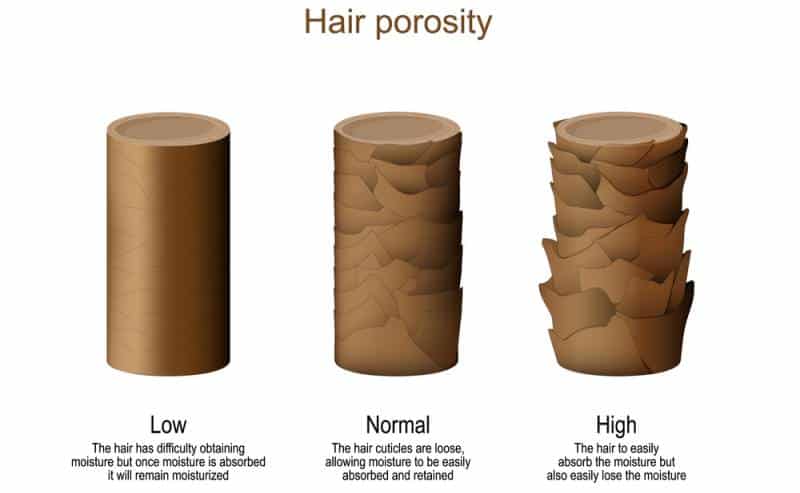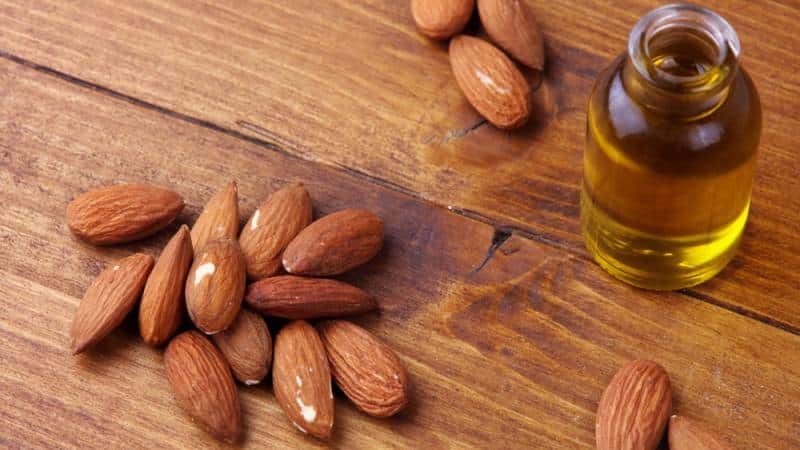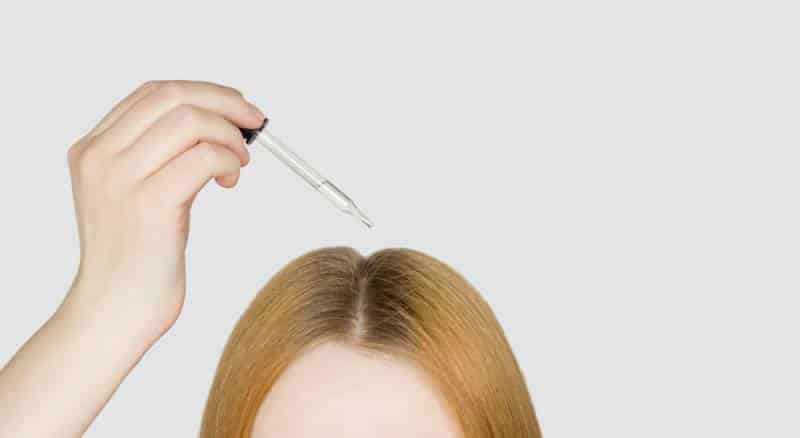High porosity hair can be a challenge to manage. The oils that work well for low porosity hair may not be the best choice for high porosity hair. This guide will help you find the right oils for your high porosity hair type.
Let’s go!

What is High Porosity Hair?
High porosity is the most commonly encountered hair type when it comes to caring for natural and curly hair. In addition to being the most common, high porosity also happens to be one of the most difficult types of hair to manage. This is due in large part to the fact that high porosity tends to absorb moisture and oils very quickly, causing them to not last long and requiring frequent and regular moisturizing.
What Causes Hair Porosity?
Porosity is essentially the ability of a substance (in this case, hair) to absorb moisture. Factors that can affect hair porosity include:
- The amount of protein in your diet. A diet high in protein is thought to help hair absorb moisture better.
- Chemical treatments, such as relaxers and bleach, which can cause the cuticle layer of your hair to become damaged or lifted. This damage causes hair to be more prone to absorbing more moisture very quickly. It also makes it harder for oils to stay on your hair for long periods of time.

Which Oils Are Good for High Porosity Hair?
The best oils to use on high porosity hair include:
- Coconut oil: Coconut oil is a natural moisturizer, with the ability to penetrate deep into your scalp and help retain moisture on your strands. It also helps make your hair appear healthy and shiny.
- Almond oil: Almond oil is a great hair moisturizer, as it can help boost circulation on your scalp. This helps increase the growth of healthy new hairs, which will blend in more naturally with your existing strands.
- Avocado oil: This type of oil is rich in antioxidants that can help repair and protect your hair from damage. It also helps restore shine and luster to your strands, making them more manageable and easier to style.
- Hemp seed oil: Hemp seed oil is packed with fatty acids that can help boost the health of your scalp and strengthen the individual strands of your hair. This makes it great for strengthening and protecting high porosity hair.
- Argan oil: Argan oil is a natural moisturizer that can help your hair retain moisture more effectively. It also helps restore shine and luster to your strands, making them look softer and silkier than before.
By using these oils specifically on high porosity hair, you can keep it looking healthy and beautiful, while also improving its overall manageability and styling flexibility.
These are just some of the best options available for high porosity hair, but there are many others out there that may be more suitable for your specific situation. Always consult a professional in order to find the best products and techniques for your high porosity hair!
Which Oils Should You Avoid for High Porosity Hair?
While there are many different types of oils that can help improve the health of your high porosity hair, there are a few to stay away from. These include:
- Jojoba oil: Jojoba oil is very similar to sebum (the natural oils produced by your skin). When used on hair, it can actually end up clogging your pores and preventing your natural oils from being able to penetrate into the hair shaft.
- Grapeseed oil: Grapeseed oil is a light moisturizer that can help seal in moisture and prevent dryness. For high porosity hair, though, grapeseed oil can cause your hair to become too greasy, which will undo all of the good work you’ve done.
- Mineral oil: Mineral oil is often used as a conditioner in hair products, but this type of oil should be avoided at all costs by anyone with high porosity hair. This is because mineral oil acts as a barrier to the natural oils that your scalp produces, making it harder for them to help moisturize and condition your hair.

How to Choose the Best Oil for High Porosity Hair?
The main goal when choosing the best oil for high porosity hair is to find something that will not only moisturize your strands but also penetrate deeply in order to improve overall health and reduce breakage.
While there are a number of different oils available, you will want to avoid mineral oils due to their tendency to reduce the amount of moisture in your hair. Instead, opt for natural oils such as coconut oil, argan oil, and jojoba oil. Each can help improve the quality of your strands by penetrating deeply into your hair cuticles and improving overall health.
Once you have chosen the best oils for high porosity hair care, be sure to pay attention to their consistency. Highly viscous and thick formulas can be more difficult to work into your strands and may lead to greasiness. Instead, opt for thinner oils that will be easier to work through your hair and absorb faster once applied.
With all of these factors in mind, you should now feel confident knowing how to choose the best oil for high porosity hair. However, if you are still unsure as to which product would work best for you, below we have outlined a number of different oils that can help improve the overall health and texture of your high porosity strands, along with their potential benefits.

How to Apply Oil to Your Hair?
There are a few different ways to apply oils to help treat high porosity hair. Some people prefer using a good quality oil as a daily moisturizer, making sure it penetrates deeply into their strands for maximum effectiveness.
Others use it in conjunction with a deep conditioning treatment, using it as a pre-treatment to help their hair absorb more of the conditioner. You can also use oils as an aftercare treatment, once your hair is out of a protective style or right before you plan on styling it.
Each of these methods can be beneficial, depending on your hair type and needs. Finding the best way to use oils for high porosity hair is often a matter of experimenting with different techniques and seeing what works for you.
Whatever method you choose, regularly moisturizing your high porosity hair is key to keeping it healthy and beautiful. And luckily, there are a wide variety of different oils available that can help you get the moisture you need.
Are There Any Downsides to Using Oils for Your Hair?
There are very few downsides to using oils for high porosity hair. In fact, oils can actually help improve the health of your hair in a number of different ways. However, it is important to make sure that you are not overusing any one particular product or technique on your high porosity hair. Doing so can cause greasiness, which can be hard to get rid of and make it difficult to style your hair. This is especially true for those with fine or thinning hair, as extra oils on the scalp can weigh down these types of strands.
Additionally, it is important to know that most natural oils are not compatible with heat styling tools like curling irons and flat irons. Because of this, you should be wary when using any type of oil with these types of tools.
Those are just a few potential downsides to oils for high porosity hair care. However, they can easily be avoided if you take the right steps to keep your strands healthy and well-moisturized.

How Long Will My Oil Treatments Last?
The length of time that your oil treatments last will depend on several different factors. These include the amount of oil you use, how often you moisturize your hair (or stop doing so), and the natural oils that are already in your hair. Generally speaking, though, it can be expected that an oil treatment should last for at least a day or two.
Do I Need to Use Any Special Products With My Oil Treatments?
Though you certainly don’t “need” to use any special products when treating high porosity hair, there are some that can definitely help. For example, a good deep conditioner can help better penetrate your strands and ensure that the moisture stays in longer. Other options include a leave-in conditioner or a hair serum, both of which help keep your oil treatments in place.
Are There Any Other Steps That Can Help With High Porosity?
Yes! There are actually quite a few things that you can do to help improve the health and manageability of high porosity strands. These include:
- Avoid tight hairstyles that put a lot of pressure on your hair. Use styles such as buns, ponytails, and French braids instead.
- Regularly use protein treatments to help strengthen your strands. This will help them stay together better after taking in moisture.
- Using heat protectants when styling your hair with curling irons, flat irons, or blow dryers. This helps keep your strands from getting overheated and damaged.
- Using a clarifying shampoo or apple cider vinegar rinse to help remove buildup that can make it harder for your hair to absorb moisture.
Related: 5 Best Oils for Low Porosity Hair


